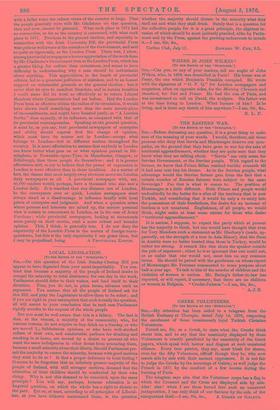LOCAL LEGISLATION.
[To THE EDITOR OF THE "SPECTATOR."]
SIR,—On this question of the Irish Sunday-Closing Bill you appear to have departed from your usual impartiality. You con- tend that because a majority of the people of Ireland desire to compel the minority to total abstinence for one day in the week, Parliament should defer to their wishes, and lend itself to their dictation. True, you do not, in plain terms, advance such an argument. You assume that all the people of Ireland ask for this Bill, and pray the Legislature to allow them to be sober ; and if you are right in your assumption that such is really the question, all will assent to your conclusion that in such case Parliament rightly accedes to the request of the whole people.
But you must be well aware that this is a fallacy. The fact is that, at the utmost, a majority of the community, who, for various reasons, do not require to buy drink on a Sunday, or who are moved L Sabbatarian opinions, or who have well-stocked cellars of their own, and comfortable parlours for drinking and smoking in at home, are moved by a desire to prevent all who want the same indulgences in other forms from procuring them, because a small minority abuse their liberty. Should Parliament per- mit the majority to coerce the minority, because with good motives they wish to do so ? Is that a proper deference to local feeling? It seems to be forgotten that an infinitely greater majority of the people of Ireland, with still stronger motives, demand that the education of their children should be conducted by their own clergy. Why is not this demand to be conceded, upon the same principle ? You will say, perhaps, because education is an Imperial question, on which the whole has a right to dictate to the part. B,ut so, at least, according to all principles of Liberal- ism, as you have hitherto maintained them, is the question whether the majority should dictate to the minority what they shall eat and what they shall drink. Surely that is a question for the collective people, for it is a great principle, the slightest in- vasion of which should be most jealously guarded, alike by Parlia- ment and by the Press, against the growing endeavours to invade it.—I am, Sir, &c.,






























 Previous page
Previous page